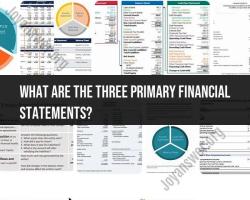What are the responsibilities of a financial analyst?
The role of a financial analyst is critical within an organization, as they play a pivotal role in helping businesses make informed financial decisions. Here is a comprehensive and detailed overview of the key responsibilities of a financial analyst:
Financial Planning and Analysis (FP&A):
- Create and maintain financial models to analyze and forecast company performance.
- Develop budgets and financial plans, ensuring alignment with organizational goals.
- Monitor financial variances and provide explanations for discrepancies.
Data Analysis and Reporting:
- Gather and analyze financial data from various sources.
- Prepare detailed financial reports, including income statements, balance sheets, and cash flow statements.
- Generate insights and recommendations based on financial analysis.
Investment Analysis:
- Evaluate investment opportunities such as stocks, bonds, or projects.
- Conduct risk assessments and perform due diligence on potential investments.
- Provide recommendations on investment strategies to maximize returns and manage risks.
Financial Forecasting:
- Forecast future financial trends and performance based on historical data.
- Assess the impact of different scenarios and market conditions on financial outcomes.
Cost Analysis:
- Analyze cost structures to identify areas for cost reduction or optimization.
- Assist in pricing strategies and cost control initiatives.
Financial Risk Management:
- Identify and assess financial risks, including market, credit, and operational risks.
- Develop strategies to mitigate risks and safeguard the organization's financial health.
Valuation:
- Determine the value of assets, companies, or projects through methods like discounted cash flow (DCF) analysis or comparable company analysis (CCA).
- Support mergers and acquisitions (M&A) activities by valuing potential targets.
Financial Modeling:
- Build complex financial models to support decision-making processes.
- Conduct sensitivity analysis to assess the impact of changing variables on financial outcomes.
Recommendations and Strategy:
- Provide insights and recommendations to senior management for strategic planning.
- Collaborate with other departments to align financial goals with broader organizational objectives.
Communication:
- Effectively communicate financial information to non-financial stakeholders.
- Prepare presentations and reports for executive and board-level meetings.
Compliance and Regulatory Reporting:
- Ensure compliance with financial regulations and reporting requirements.
- Stay updated on changes in financial regulations and advise the organization accordingly.
Continuous Learning:
- Stay current with industry trends, financial software, and analytical tools.
- Pursue professional certifications like Chartered Financial Analyst (CFA) or Certified Public Accountant (CPA) to enhance expertise.
Team Collaboration:
- Collaborate with cross-functional teams, including accounting, marketing, and operations, to gather and analyze data.
Ethical Considerations:
- Maintain high ethical standards in financial reporting and analysis.
- Avoid conflicts of interest and ensure transparency in financial dealings.
In summary, financial analysts play a multifaceted role in an organization, combining analytical skills with financial expertise to support decision-making, manage risks, and drive financial success. Their work is essential for businesses to thrive in a competitive and dynamic financial landscape.












